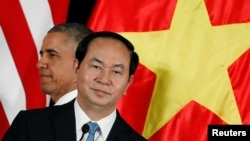 |
| U.S. President Barack Obama attends a press conference with Vietnam's President Tran Dai Quang at the Presidential Palace in Hanoi, Vietnam May 23, 2016. |
Cambodia Heaps Praise on U.S.-Vietnam Climate Accord
VOA | 26 May 2016
The two countries announced they would work to implement the Paris
Agreement, an international agreement signed by 177 countries in April.
PHNOM PENH —
Sao Sopheap, environment ministry spokesman, said Cambodia was still
lacking in many of the tools needed to combat the threat of climate
change.
Officials and environmentalists have congratulated Vietnam and the
United States on a recent climate changed agreement signed between the
two former adversaries, saying the co-operation will have a positive
impact on mitigating the effects of the phenomenon in the region.
On Sunday, the two countries announced they would work to implement
the Paris Agreement, an international agreement signed by 177 countries
in April.
The agreement signed last weekend covers energy policy, land use and
carbon emissions, while emphasizing maintaining Vietnam’s rapid economic
growth.
The U.S. will also assist Vietnam to build up its resilience to climate change, according to a statement released on Sunday.
This will include preserving forests and biodiversity, monitoring
greenhouse gas emissions, investing in low-emissions technology, climate
resilient agriculture techniques, improving the livelihoods of
small-holder farmers, and managing coastal zones and mangrove forests.
“If the U.S. work in Vietnam is a success, it could contribute to mitigating climate change globally,” he said.
“Cambodia as well as other countries in the world welcomes and offers
congratulations on the successful agreement of cooperative work between
Vietnam and the U.S.” he added. “We want co-operation and support...
that includes financial, technical, and human resources.”
Tek Vannara, director of the umbrella group NGO Forum, said the
agreement would “more or less have a positive impact on Cambodia.”
“But we can’t forecast how big or how small the program will positively have on Cambodia,” he said.
“If the U.S. works with Cambodia on strengthening people’s capacity
in regard to adapting to climate change in the agriculture sector,
renewable energy and investment, that could fit with the climate change
phenomenon, it would be good,” he added.
“If a project is to be done in Cambodia, the result will be directly
seen, and some Cambodian people will be able to adapt to [climate
change], and get new technical assistance regarding green growth
development.”
Tek Vannara added that the most appealing factor coming out of the
Vietnam-U.S. talks was that “Vietnam has a green growth development
strategy,” which he said could significantly contribute to mitigating
greenhouse emissions.
However, critics of the Cambodian government’s forestry policies say
the willingness of the authorities to turn a blind eye to rampant
illegal logging, often encouraged by Vietnamese demand and investment,
cast doubt on Phnom Penh’s commitment to climate change mitigation.
“They could do the same thing in Cambodia, but Cambodia keeps
annihilating the forest,” said Ou Virak, founder of the Future Forum
think tank.
“It keeps showing the lack of commitment to curbing environmental exploitation in Cambodia, so co-operation is limited.”
“I see that the world is eager to help Cambodia. A lot of money could
flow into Cambodia to help support Cambodia, its government, and
Cambodian people,” he said.
Sopheap denied that government policy had contributed to the rapid deforestation rate seen in Cambodia in recent decades.


No comments:
Post a Comment